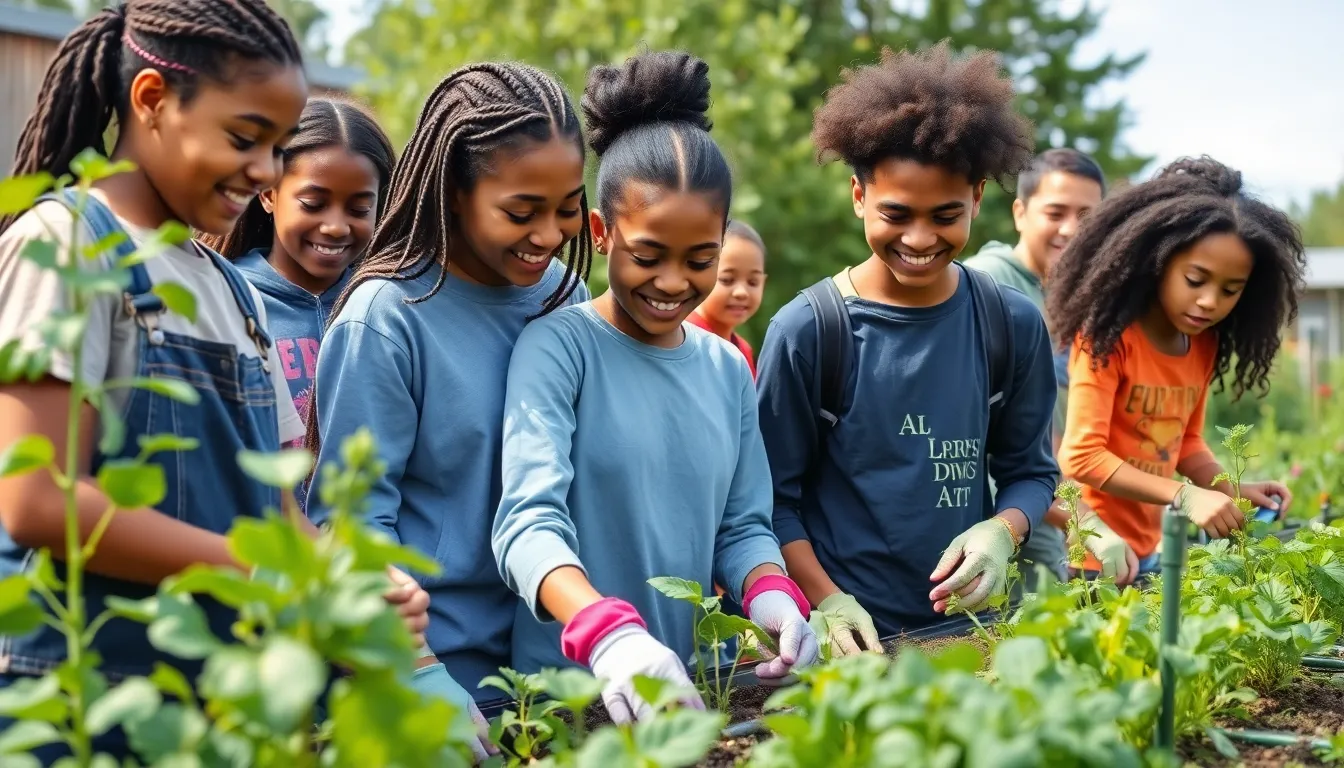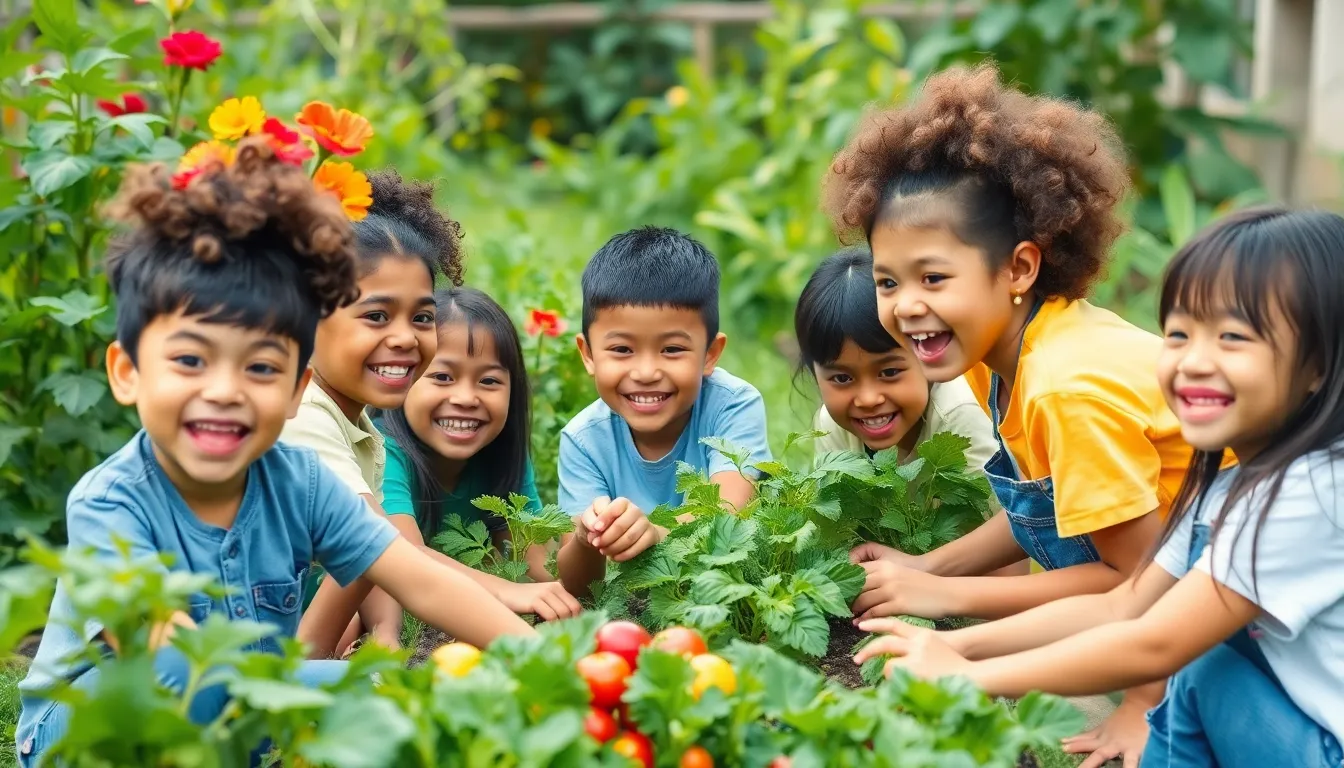Table of Contents
ToggleIn a world where the ice caps are melting faster than your favorite ice cream on a hot day, sustainability education has never been more crucial. It’s not just about hugging trees or recycling bottles; it’s about empowering future generations to make smarter choices for our planet. Think of it as the ultimate life hack for living well while keeping the Earth happy.
Overview of Sustainability Education
Sustainability education focuses on teaching the principles and practices that promote environmental stewardship. It encompasses a broad range of topics, including resource management, ecological balance, and social equity. Students engage with various interdisciplinary approaches to understand complex sustainability challenges.
Curricula integrate hands-on activities that encourage critical thinking. Real-world applications enhance students’ ability to analyze sustainability issues effectively. For example, school gardens offer practical experience in growing food while understanding ecosystems.
Numerous organizations advocate for sustainability education at all levels. Nonprofits, universities, and government agencies work together to develop resources. They aim to provide teachers with necessary training and materials to teach these important concepts effectively.
Research shows that sustainability education improves environmental awareness among students. Statistics indicate that schools incorporating sustainability practices report higher engagement levels and improved student performance. The benefits extend beyond the classroom, fostering a generation committed to environmental action.
Community involvement enhances sustainability education. Local partnerships help bring relevant projects into schools, connecting students with their environments. Such collaborations reinforce learning and inspire students to become active participants in sustainability initiatives.
Personal empowerment is crucial in sustainability education. It instills a sense of responsibility in students to make informed choices. Encouraging students to identify personal actions fosters a lifelong commitment to sustainability practices.
This holistic approach to sustainability education ensures that individuals not only understand the challenges but also possess the skills required to address them effectively. The integration of sustainability concepts in education serves as a foundation for creating informed citizens dedicated to a sustainable future.
Importance of Sustainability Education

Sustainability education plays a crucial role in shaping environmentally conscious individuals. It equips learners with the knowledge and skills necessary to make informed decisions that benefit the planet.
Environmental Impact
Sustainability education significantly enhances environmental awareness. By understanding ecological principles, students recognize the implications of their actions on natural resources. Participating in hands-on activities like community gardens allows students to apply concepts directly to real-world situations. This practical experience fosters a connection to the environment. Research shows that schools with sustainability programs witness decreased waste production. Engagement in sustainability education often leads to students advocating for positive environmental change in their communities. Thus, increased knowledge results in more responsible behaviors that contribute to long-term ecological health.
Social Responsibility
Through sustainability education, students develop a sense of social responsibility. Learning about social equity encourages them to consider the broader impact of their choices on communities. Engaging in collaborative projects can strengthen partnerships with local organizations. These initiatives inspire students to actively participate in sustainable practices beyond the classroom. Commitment to social responsibility fosters empathy and awareness regarding pressing global issues. Individuals equipped with this mindset tend to advocate for justice and equity in environmental matters. Strengthening community ties through sustainability education promotes shared responsibility for local and global challenges.
Strategies for Effective Sustainability Education
Sustainability education thrives on practical approaches. Integrating sustainability into the curriculum enhances comprehension and application. Engaging students in interdisciplinary lessons helps connect environmental issues to various subjects, such as science and social studies. School-wide initiatives urge collaboration among teachers to create thematic units, making sustainability a core aspect of learning. Resources from organizations provide valuable materials and support for effective teaching. Assessments should reflect understanding of sustainability concepts, ensuring students grasp their relevance.
Utilizing experiential learning transforms theoretical knowledge into practical skills. Hands-on activities, such as outdoor classrooms and community projects, facilitate active engagement in sustainability practices. Students build connections with their surroundings while gaining real-world insights through practices like local gardening. Participating in field trips to nature reserves or recycling facilities deepens understanding of ecosystems and resource management. Collaborating with community members fosters a sense of belonging and responsibility. Schools can implement sustainability challenges that encourage friendly competition, promoting teamwork and collective efforts toward sustainability goals.
Challenges in Sustainability Education
Sustainability education faces several challenges. Institutional barriers and student engagement issues often hinder its implementation.
Institutional Barriers
Many educational institutions struggle to integrate sustainability into their curricula. Budget constraints limit resources, while outdated policies can impede progress. Teacher training programs frequently lack sufficient emphasis on sustainability concepts, resulting in a workforce unprepared to teach these vital subjects. Administrators must navigate bureaucracy and competing priorities, making it difficult to prioritize sustainability initiatives. Collaboration between organizations remains essential; without support from policymakers, efforts toward sustainable practices may falter.
Student Engagement
Engaging students in sustainability education often proves challenging. Conventional teaching methods may not resonate with today’s learners, leading to disengagement. Varied interests among students create obstacles in maintaining a universal approach to sustainability topics. Integrating hands-on experiences, like community projects, can enhance involvement and enthusiasm. Making lessons relevant to students’ lives fosters connection and motivation. Schools that emphasize experiential learning can inspire a sense of responsibility towards environmental stewardship, encouraging students to take action beyond the classroom.
Future Directions in Sustainability Education
Emerging trends indicate the need for innovative frameworks in sustainability education. Integration of advanced technologies, like virtual reality and interactive simulations, enhances students’ engagement and understanding of complex environmental issues. Schools may incorporate project-based learning, where students tackle real-world problems, encouraging collaboration and critical thinking.
Interdisciplinary approaches continue to gain traction, connecting environmental science with economics, sociology, and policy studies. This connection fosters a comprehensive understanding of sustainability, allowing students to explore diverse perspectives. Engaging local communities in sustainability projects strengthens ties and enriches students’ learning experiences.
Incorporating diverse cultural perspectives into the curriculum is vital. Recognizing indigenous knowledge systems highlights traditional ecological practices and strengthens sustainability education. Such inclusivity promotes respect for various viewpoints while enriching the educational experience.
Moreover, policy advocacy plays a crucial role in shaping the future of sustainability education. Stakeholders can influence educational standards, ensuring sustainability education becomes a core component in school curricula. Enhanced teacher training programs focused on sustainability concepts will equip educators with the necessary tools to inspire their students.
Collaboration among educational institutions, nonprofits, and government agencies proves essential. Partnerships enhance resource development and create innovative programs that support effective teaching practices. School districts can leverage these alliances to share best practices and benefit from collective experiences.
Expanding awareness of global sustainability challenges remains important. Encouraging students to participate in international sustainability initiatives fosters a sense of global citizenship. Incorporating service-learning projects can further empower students to take active roles in their communities while addressing pressing environmental issues.
Sustainability education is crucial for shaping a generation that values environmental stewardship and social responsibility. By integrating hands-on experiences and interdisciplinary approaches, students not only learn about sustainability but also develop the skills to make impactful decisions. The collaboration among schools, nonprofits, and government entities enhances resource availability and creates innovative programs that inspire action.
As challenges persist in implementing these educational practices, the emphasis on personal empowerment and community involvement remains vital. By fostering a culture of sustainability within educational settings, individuals can emerge as informed citizens ready to tackle the pressing environmental issues of today and tomorrow.





